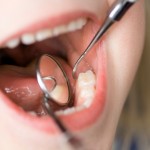
Early childhood caries (ECC) is a common chronic childhood disease and a serious concern for child welfare. In the USA its incidence has increased from 24% to 28% in recent decades. The aim of this study was to compare an intensive early intervention caries prevention strategy against a more limited control intervention.
At 4 months postpartum mother-child dyads were randomised to either the intervention or control. The intervention arm received chlorhexidine (CHX) mouthrinse for 3 months beginning 4 months postpartum and children received fluoride varnish (FV) every 6 months from age 12–36 months. The control group received FV if precavitated lesions developed. Both groups received oral health counselling. Mothers’ salivary mutans streptococci (MS) and lactobacilli levels were assessed together with caries incidence in the children at 36 months.
They found
- No significant difference in children’s 36-month caries incidence between groups
- 34% in each group developed caries
- About half of control group developed precavitated lesions and received therapeutic FV
- Maternal MS levels declined during CHX use, but increased when discontinued
The authors concluded
Maternal postpartum CHX regimen, oral health counselling and preventive child FV applications were not more efficacious than maternal counselling with child therapeutic FV for precavitated lesions for ECC prevention. FV for young children with brief maternal CHX use and oral health counselling may need to be combined with additional or longer-term therapies to significantly reduce ECC in high-risk populations.
Ramos-Gomez FJ, Gansky SA, Featherstone JD, Jue B, Gonzalez-Beristain R, Santo W, Martinez E, Weintraub JA. Mother and youth access (MAYA) maternal chlorhexidine, counselling and paediatric fluoride varnish randomized clinical trial to prevent early childhood caries. Int J Paediatr Dent. 2011 Oct 17. doi:10.1111/j.1365-263X.2011.01188.x. [Epub ahead of print] PubMed PMID: 21999806.
